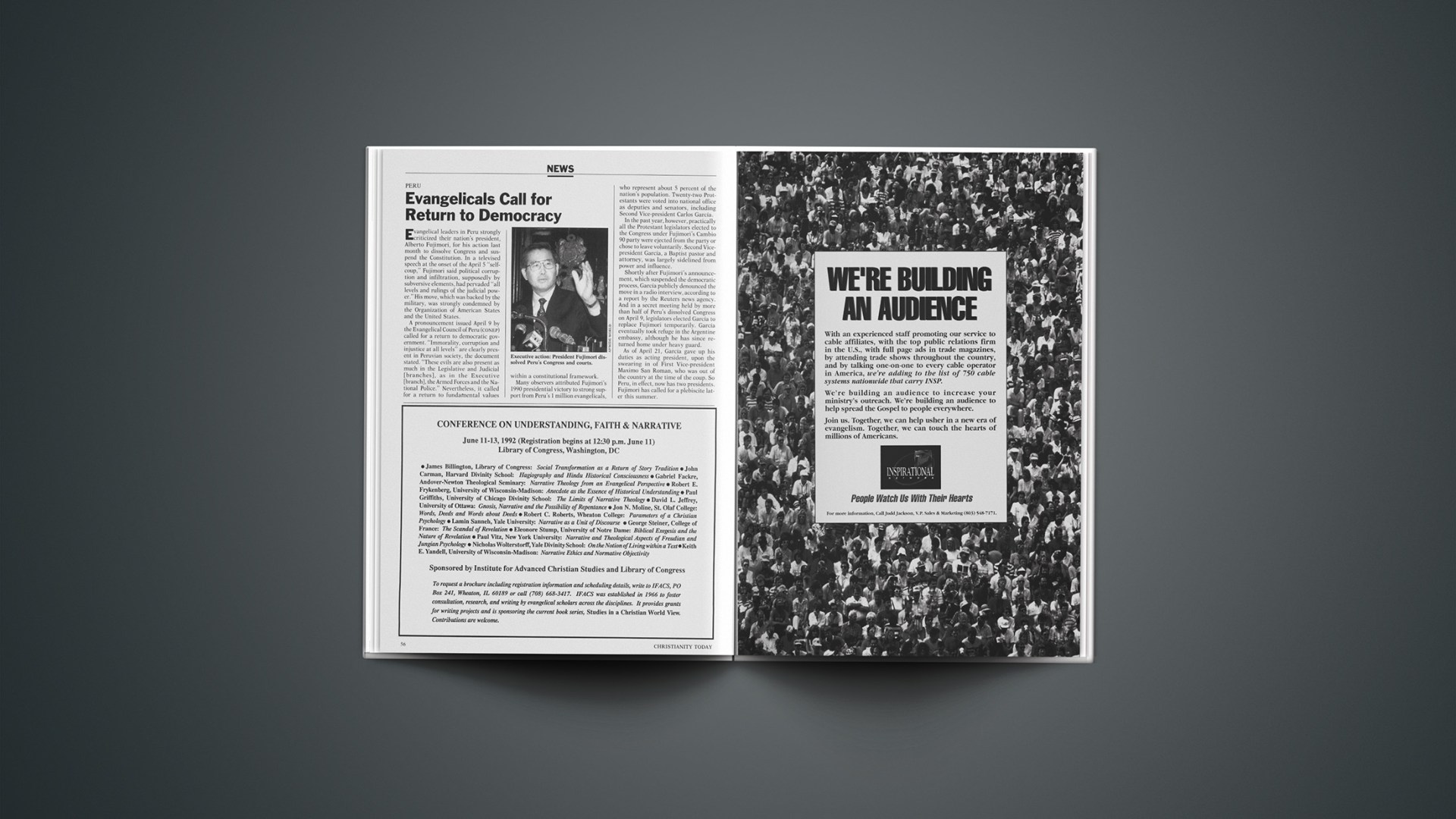Evangelical leaders in Peru strongly criticized their nation’s president, Alberto Fujimori, for his action last month to dissolve Congress and suspend the Constitution. In a televised speech at the onset of the April 5 “self-coup,” Fujimori said political corruption and infiltration, supposedly by subversive elements, had pervaded “all levels and rulings of the judicial power.” His move, which was backed by the military, was strongly condemned by the Organization of American States and the United States.
A pronouncement issued April 9 by the Evangelical Council of Peru (CONEP) called for a return to democratic government. “Immorality, corruption and injustice at all levels” are clearly present in Peruvian society, the document stated. “These evils are also present as much in the Legislative and Judicial [branches], as in the Executive [branch], the Armed Forces and the National Police.” Nevertheless, it called for a return to fundamental values within a constitutional framework.
Many observers attributed Fujimori’s 1990 presidential victory to strong support from Peru’s 1 million evangelicals, who represent about 5 percent of the nation’s population. Twenty-two Protestants were voted into national office as deputies and senators, including Second Vice-president Carlos García.
In the past year, however, practically all the Protestant legislators elected to the Congress under Fujimori’s Cambio 90 party were ejected from the party or chose to leave voluntarily. Second Vice-president García, a Baptist pastor and attorney, was largely sidelined from power and influence.
Shortly after Fujimori’s announcement, which suspended the democratic process, García publicly denounced the move in a radio interview, according to a report by the Reuters news agency. And in a secret meeting held by more than half of Peru’s dissolved Congress on April 9, legislators elected Garcia to replace Fujimori temporarily. Garcia eventually took refuge in the Argentine embassy, although he has since returned home under heavy guard.
As of April 21, García gave up his duties as acting president, upon the swearing in of First Vice-president Maximo San Roman, who was out of the country at the time of the coup. So Peru, in effect, now has two presidents. Fujimori has called for a plebiscite later this summer.
The action that led Fujimori to assume near dictatorial powers has as much to do with corruption and economic blight as it does with a violent insurgency intent on overthrowing the government in favor of a radical, Maoist regime promoted by an organization known as the Shining Path. In an interview with the New York Times, a Shining Path revolutionary affirmed, “The 1990s will be the decade of victory.” She said Peruvians who did not embrace Maoism would face three choices: emigration, re-education camps, or what she described as “popular justice.” To date, more than 500 pastors and layworkers have died in the 12-year conflict.
Peruvians have adopted a wait-and-see attitude toward Fujimori. Four major surveys carried out after April 7 indicated that most people understand Fujimori’s action, yet had reservations over the suspension of constitutional guarantees.
Saving Democracy
Evangelical leaders have for the most part been disillusioned by the Congress, although generally supportive of Fujimori despite the fact that he has largely turned his back on his evangelical supporters. According to a knowledgeable source with close ties to García and congressional deputy Guillermo Yoishikawa, the Protestant legislators are in agreement with Fujimori that there are serious problems in Peru today. However, “Fujimori is not the only one who can solve the problems,” he said. “We believe that you cannot kill democracy to save democracy.” The legislators said they hope to find a face-saving way for Fujimori to leave office and are willing to discuss a negotiated end to his administration.
Until that moment arrives, counselors to the Protestant politicians are urging them to maintain their Christian testimony, refrain from political polarization, and make room for a ministry of reconciliation. Most of those legislators are political neophytes, with limited experience in government.
Uppermost in everyone’s mind, however, is the fear that the OAS may impose severe economic sanctions that could cripple Peru. While sanctions may be effective in evicting Fujimori from office, they could also give the Shining Path insurgency an opportunity to make significant and irretractable advances in its own bid to establish a new order. Said one source, “The sanctions would push Shining Path to the forefront.”
By Chris Woehr, News Network International.










